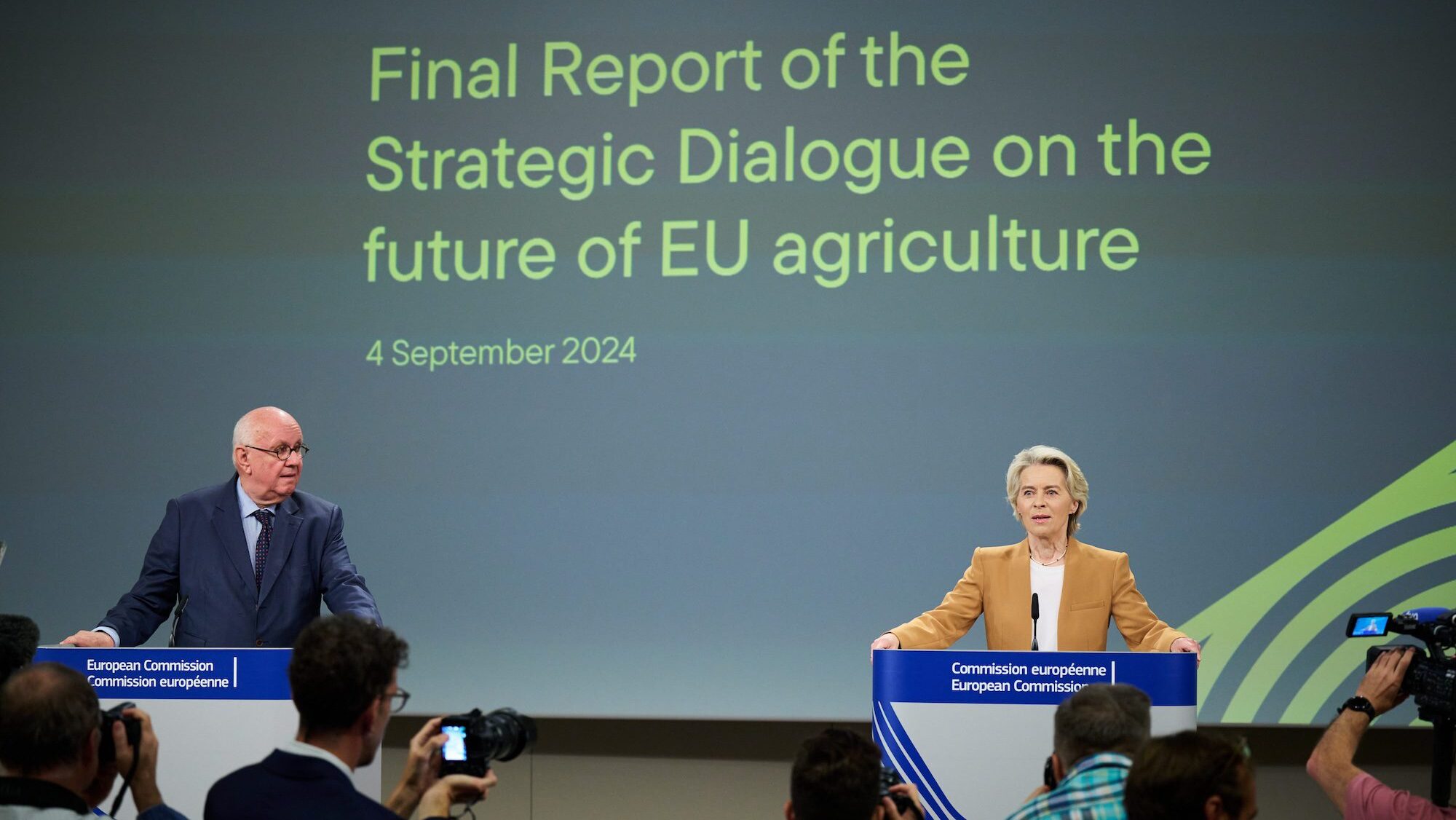
EU Commission President Ursula von der Leyen (right) with Peter Strohschneider, Chairman of the Strategic Dialogue on the Future of EU Agriculture.
Photo: Dati Bendo / © European Union, 2024
After seven months of consultations, an advisory body—comprising both European Union officials and agricultural and environmental organizations—finally unveiled its report on overhauling the EU’s long-term agricultural policy. It submitted its recommendations on future policy-making to the European Commission for deliberation on Wednesday, September 4th.
The group, called the “Strategic Dialogue on the future of EU agriculture” was launched by the Commission in January, with a stated goal of finding a middle ground between addressing the demands of dissatisfied farmers and reaching the bloc’s ambitious climate targets. This contradiction poses a central dilemma, driving the EU-wide farmers’ protests in the past year.
The conflict between these two positions could well turn the group into a distraction from the real needs of farmers—or worse. Would the body offer anything new to people whose way of life is under threat? Ominous signs in its launch document evince sympathy for plant-based food, animal rights, and the ideology of sustainability.
The Dialogue’s 29 member organizations include “key stakeholders” such as farmers, agri-food businesses, rural communities, climate and animal rights NGOs, financial institutions, and academic experts.
According to European Commission president Ursula von der Leyen at Wednesday’s press conference:
The outcome of this Strategic Dialogue shows that it’s possible to move beyond a polarized debate and create trust among very diverse stakeholders[who] all agreed that we need to stick to our climate goals.
Critics might say that it’s easy to reach such a consensus if the participants in the consultation were all carefully selected by the Commission, with minimal risk of including anyone who might share a different opinion.
That said, von der Leyen stressed that there is a “consensus” that Europe’s farming communities will be among the “first victims” of climate change and, therefore, “more ambitious steps” need to be taken to turn agriculture both financially and environmentally sustainable.
Grateful to the Strategic Dialogue & Chair Prof. Strohschneider.
— Ursula von der Leyen (@vonderleyen) September 4, 2024
For their vision and concrete recommendations for an agriculture that works with and for nature.
And that promotes a competitive European food value chain.
Let's keep that positive spirit alive.
The recommendations within the 110-page report are structured around five “pillars,” major guidelines that are further broken down into concrete policy ideas that, in turn, are meant to be the backbone of Europe’s agricultural strategy for at least the next 10-15 years.
These categories include strengthening farmers’ competitiveness in the market, building more resilient and environmentally friendly food production chains, and making the industry more attractive to young people by focusing on innovation, gender equality, and “vibrant” rural areas.
Another main pillar is called “advancing towards sustainable agri-food systems,” which—as Prof. Peter Strohschneider, the group’s chairman explained—is about promoting more sustainable farming and consumer practices, including a bigger emphasis on animal rights and a “crucial rebalance” to plant-based protein sources to reduce meat consumption.
These are only recommendations for now, but the Commission president promised she will submit a legislative package based on them to the other EU institutions at some point within the first hundred days of her new incoming administration.
In the eyes of von der Leyen, the reforms should serve two key objectives. First, to ensure “fair and sufficient” income for farmers by slashing red tape and improving their competitiveness. EU farmers’ inherent disadvantage on the market was one of the main complaints of the protesters, who claimed that Brussels’ regulations make their food too costly to produce compared to non-EU imports.
The other key objective, she stressed, was to create an agricultural sector that works “for nature and with nature.” For this, the EU will pivot towards a slightly different approach, with less focus on penalizing violators, and more emphasis on incentives that will “reward” farmers who adopt more environmentally friendly farming methods and willingly reduce their carbon footprint.
In principle, all climate obligations remain in place, von der Leyen added, but the new approach (which already commenced in Spring 2024) is about “less micromanagement and more trust” in small farmers, who are expected to adhere to the rules without Brussels breathing down their necks.
Expanding on the report, Prof. Strohschneider further noted that the document takes a “holistic approach” to reforms rather than trying to introduce excessively concrete quantitative targets that can be changed and adapted over time.
Accordingly, his most important recommendations include the establishment of an objective “benchmarking” system that would allow for a “dynamic regulatory and incentive” framework as well as turning the Dialogue into some kind of permanent advisory body within the EU’s institutional structure. In theory, this would ensure all relevant stakeholders would retain a degree of influence over the process. Whether or not the recommendations will improve the position of European farmers remains to be seen.
